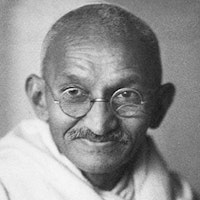Nonviolence is a lifestyle that one has to adopt, which means allowing all the love, understanding, respect, compassion, acceptance, and appreciation to emerge and dominate one’s attitude.
Mohandas K. Gandhi

This Philosophy
Topic: Global Peace & Development
This philosophy is not like a jacket that you wear when necessary and discard when not. Nonviolence is a lifestyle that one has to adopt, which means allowing all the love, understanding, respect, compassion, acceptance, and appreciation to emerge and dominate one’s attitude. Then we will be able to build good relationships not only within the family but outside of the family. We will no longer be selfish and greedy but magnanimous and giving.
Mohandas Karamchand Gandhi, known universally as Mahatma Gandhi, was born on October 2, 1869, in Porbandar, a small town on the western coast of India. He hailed from a Hindu merchant caste family and his father served as the chief minister of Porbandar state. Gandhi's youth was shaped by deeply spiritual influences that stemmed from his mother's devout Jainism, which instilled in him beliefs in non-violence, fasting, meditation, and vegetarianism. As a young man, Gandhi travelled to London to study law, an experience that further broadened his perspective and exposed him to Western ideas of justice and equity.
Returning to India after completing his studies, Gandhi found himself dissatisfied with the legal profession and soon moved to South Africa to work on a legal case. It was in South Africa, faced with rampant racial discrimination, that Gandhi began to refine the philosophy of non-violent resistance, or Satyagraha, a principle deeply rooted in his religious beliefs. For nearly 21 years, Gandhi strove for the civil rights of Indians in South Africa, successfully employing methods of civil disobedience and passive resistance.
In 1915, Gandhi returned to India, bringing with him his deeply entrenched ideas of Satyagraha. He assumed leadership of the Indian National Congress and led nationwide campaigns for easing poverty, expanding women's rights, ending untouchability, and achieving Swaraj, or self-rule. His role in the Indian independence movement was monumental, with his leadership and doctrines of non-violent resistance culminating in India's independence from British rule in 1947. However, his life was tragically cut short when he was assassinated on January 30, 1948. His legacy, nonetheless, continues to inspire peace movements globally, securing his place as one of the most significant figures of the 20th century.
Gandhi, Arun. “The Relevance of Gandhi Today.” Arun Gandhi - 5th Grandson of Mahatma Gandhi: Legacy of Love, 4 June 2013, arungandhi.net/the-relevance-of-gandhi-today/.

Mohandas K. Gandhi
Theme: Peace

About This Mohandas K. Gandhi Quotation [Commentary]
Mohandas K. Gandhi’s philosophy of nonviolence extends far beyond the mere absence of physical harm; it is an embracing of life principles that foster harmony and understanding. When Gandhi speaks of nonviolence as a lifestyle of “allowing all the love, understanding, respect, compassion, acceptance, and appreciation to emerge and dominate one’s attitude,” he encapsulates the essence of a life lived in profound connection with others. This philosophy, inherently intertwined with forgiveness, suggests that to forgive is not a momentary act but a sustained way of being. Through the lens of forgiveness, nonviolence becomes a dynamic process of continually embracing others’ humanity, recognizing our shared vulnerabilities, and seeking to heal rather than to harm.
The context of Gandhi’s teaching reveals that nonviolence is not a convenience but a commitment to principled living. It challenges the notion of forgiveness as a mere reactive gesture, transforming it into a proactive way of life. This life choice builds bridges between individuals, fostering good relationships that extend beyond the familial to encompass all societal interactions. In Gandhi’s vision, adopting a nonviolent approach shifts the focus from self-centeredness to a broader, magnanimous way of being that prioritizes giving over receiving. This shift is fundamental to building a community where individuals are not driven by selfishness and greed but are inspired by a sense of shared well-being and mutual respect.
Understanding Gandhi’s teachings in the context of forgiving, we find that forgiveness is an expression of the strength that lies at the heart of nonviolence. It is not about overlooking or excusing wrongs but about confronting them with a spirit that refuses to be reduced to hatred or vengeance. Gandhi’s perspective invites individuals to cultivate an inner resilience and strength that empowers them to respond to life’s challenges with a compassionate and understanding heart. This profound approach to living ensures that forgiveness is woven into the fabric of daily existence, promoting peace and understanding in a world often torn by conflict and strife.
Additional Mohandas K. Gandhi Quotes
Resources
Related Quotes
Copyright © 2017 – 2025 LuminaryQuotes.com About Us